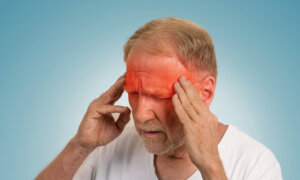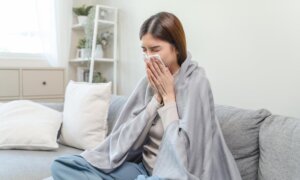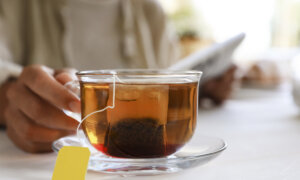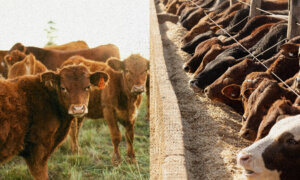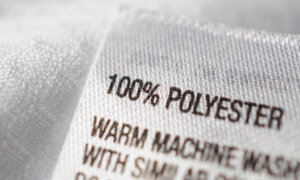Failing to seal those leftover noodles properly could lead to more problems than just a funky-tasting meal.
Chao Ming-wei, a certified toxicologist with the American Board of Toxicology and an associate professor in the Department of Biotechnology at Chung Yuan Christian University in Taiwan, shared on the Epoch Times’ “Health 1+1” program how small lifestyle changes can reduce cancer risk. He also explained how to correctly store food in the refrigerator and wash and cook vegetables to minimize the harmful effects of toxic substances on the body.
Signs of Cancer
In March, Mr. Chao, author of the newly published book “
Mom Failed to Fight Cancer,“ recounted on ”Health 1+1” that his mother, who did not eat sweets, drink alcohol, or smoke, was suddenly diagnosed with pancreatic cancer, leaving the family in shock.
Mr. Chao observed that less than a year after his mother retired at the age of 65, she began to exhibit some unusual symptoms. She frequently had fevers, about once every two to three weeks, and despite eating a lot, she lost weight. Initially, he did not take her to the oncology department. He speculated that the fevers might be related to immune system issues, endocrine problems, or bacterial infections, so they visited urology and gastroenterology departments but could not find the cause of her symptoms.
Eventually, they went to the hematology-oncology department. Upon hearing about Mr. Chao’s mother’s symptoms, the doctor ordered a CT scan and MRI, which revealed a tumor next to her pancreas.
Mr. Chao described cancer as typically silent and not visible from the outside, making it difficult to detect in its early stages. Therefore, it is crucial to be particularly vigilant for any signs of cancer.
According to the National Cancer Institute, common symptoms that cancer may cause include:
- Unexplained weight gain or loss
- Unexplained fever or night sweats
- Persistent and severe fatigue
- Lumps or thickened areas under the skin
- Changes in bowel or bladder habits
- Unexplained bleeding or bruising
- Persistent cough or hoarseness
- Difficulty swallowing, pain after eating, or changes in appetite
- Skin changes such as itching or redness
Health Risks Associated With Improper Food Storage
Many everyday kitchen habits may be associated with an increased risk of cancer. For instance, poor practices in storing food in the refrigerator can contribute to cancer risk factors.
Mr. Chao emphasized that not all food stored in the refrigerator can be adequately preserved. The fridge is a humid environment conducive to the growth of bacteria and mold, and while the low temperature slows their growth, it does not entirely prevent it.
Mr. Chao highlighted that certain foods are not suitable for refrigeration. For instance, leftover food not correctly wrapped in plastic can develop bacteria and mold after just a few days in the refrigerator, posing a health risk if consumed.
Mycotoxins primarily affect health through diet, respiration, or skin contact. Numerous studies have shown that long-term exposure to indoor toxic mold increases the risk of respiratory illnesses and cancer. One study indicated that exposure to aflatoxins produced by mold is associated with an increased risk of gallbladder cancer. Aflatoxin is also a known risk factor for hepatocellular carcinoma.
Additionally, grains and legumes like mung beans, soybeans, and red beans can become contaminated with bacteria and mold if not stored properly in the refrigerator, and these contaminants can thrive even at low temperatures. Mr. Chao recalled seeing soybeans that turned into “black beans” with moldy spots after they had been stored in the fridge. Therefore, while refrigeration is not always necessary for these foods, if they are stored in the refrigerator, they should be kept in sealed containers.
Mr. Chao also emphasized the importance of proper medication storage. Apart from protein-based medications and eye drops that need refrigeration, other drugs, such as painkillers and cold medicine, do not require refrigeration and should be kept in a cool, dry place. Mr. Chao has seen pills and capsules develop mold spots due to improper storage.
Regarding fruits, Mr. Chao recommends discarding the entire fruit if any part is moldy rather than simply cutting away the affected section. Mold’s long roots can penetrate the thick skin and reach the flesh, so consuming the fruit after removing the moldy part may still expose you to some mold. Eating such food regularly can weaken the immune system, leading to issues like asthma, skin irritation, and atopic dermatitis.
As for cheese and bread, Mr. Chao advises discarding them entirely at the first sign of mold, even if it appears superficial, as it can be difficult to assess if the mold has penetrated deeper layers.
Increased Cancer Risk Due to Pesticides
Pesticide residues in agricultural products are a major source of pesticide exposure.
One study found that pesticides may increase the risk of cancer by damaging internal organs, inducing oxidative stress, and causing inflammation. Researchers noted that “organophosphorus pesticides can induce inflammation, affect lymphocyte function, and interact among microorganisms and the immune system, increase oxidative stress, disrupt estrogen pathways, damage brain function, and increase the risk of cell carcinogenesis.”
Another study indicated that pesticide exposure is associated with an increased risk of cancers such as pancreatic and brain cancers.
Mr. Chao pointed out that pesticides gradually accumulate in the body, reducing the activity of the immune system in a manner similar to mold. This can, in turn, diminish the ability of immune cells to kill bacteria.
Pesticides can be classified as water-soluble and oil-soluble, with most being the latter. When sprayed on crops, oil-soluble pesticides resist being washed away by rain. Therefore, simply washing them with water is insufficient to remove them. Mr. Chao recommends adding a small amount of natural cleaning agent or baking soda when washing produce. However, he cautions against excessive use, which can damage the produce.
Mr. Chao explained that the proper method is to soak the produce in water mixed with a small amount of natural cleaning agent or baking soda, gently scrub it with a sponge, and rinse it under running water for five minutes. According to Mr. Chao, this process removes 80 percent to 90 percent of the pesticides. He noted that while it is impossible to eliminate pesticides, this method can significantly reduce their harmful effects on health.
Another option is to opt for organic, pesticide-free food whenever possible.
Reducing Lung Cancer Risk With Range Hoods
A study published in Scientific Reports in 2020 highlighted that long-term exposure to cooking oil fumes increases the risk of lung cancer. This has led to many women who frequently cook developing lung cancer despite their being nonsmokers.
The study also found that long-term use of range hoods while cooking can reduce the risk of lung cancer in nonsmoking women by more than 50 percent.
Mr. Chao pointed out that the common practice of stir-frying involves heating oil and garlic, leaning in to smell the aroma, and then cooking the dish on high heat. These actions can be detrimental to health. He explained that the oil fumes produced during high-temperature cooking mainly comprise PM 2.5 (particulates of a size that can enter the body), benzo[a]pyrene, polycyclic aromatic hydrocarbons, and formaldehyde. Long-term inhalation of these fumes can cause lung cell inflammation, cell death, oxidative DNA damage, and, ultimately, lung cancer. In Asia, it is more common for housewives who frequently cook to develop lung cancer, even if they do not smoke or drink.
Mr. Chao recommends installing high-quality range hoods in the kitchen to reduce the harmful effects of toxic oil fumes.
Additionally, instead of the traditional high-heat stir-frying method, Mr. Chao recommends blanching before stir-frying. This method involves heating the pan, adding the vegetables, then a small amount of water, covering the pan, and cooking for a few minutes before adding oil for stir-frying. This approach can significantly reduce oil fumes.
Cookware That Can Be Harmful to Health
Some harmful substances in certain cookware can leach into food, increasing the risk of various diseases. Therefore, it is essential to choose kitchen utensils wisely.
Mr. Chao recommends choosing certified stainless steel cookware, which is heat-resistant and less prone to sticking. In contrast, cast iron pans can easily stick, and scrubbing them with a brush may leave scratches. Heavy metals can leach into the food when cooking with these scratched pans at high temperatures and with oil, posing a significant health risk.
Additionally, Mr. Chao noted that certain nonstick pans with Teflon coatings may contain the toxic chemical perfluorooctanoic acid (PFOA), which can accumulate in the body and is linked to an increased risk of various cancers.
He also noted that aluminum cookware is susceptible to scratches and may release aluminum oxide when exposed to acidic substances, potentially leading to neurological diseases such as dementia. Melamine tableware can also pose various health risks; using items with excessive levels of melamine may increase the likelihood of kidney stones, kidney failure, and even death. Lastly, brightly colored plastic tableware may contain harmful heavy metals in their dyes.




